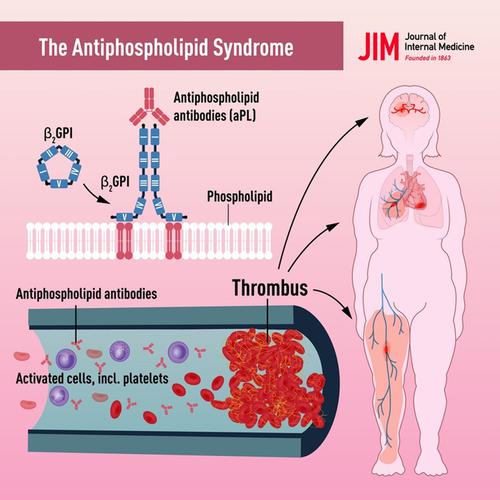当前位置:
X-MOL 学术
›
J. Intern. Med.
›
论文详情
Our official English website, www.x-mol.net, welcomes your
feedback! (Note: you will need to create a separate account there.)
The antiphospholipid syndrome - often overlooked cause of vascular occlusions?
Journal of Internal Medicine ( IF 9.0 ) Pub Date : 2020-02-11 , DOI: 10.1111/joim.13022 E Svenungsson 1 , A Antovic 1
Journal of Internal Medicine ( IF 9.0 ) Pub Date : 2020-02-11 , DOI: 10.1111/joim.13022 E Svenungsson 1 , A Antovic 1
Affiliation

|
The antiphospholipid syndrome (APS) was fully recognized as a clinical entity in the early 1980s. Still, more than 30 years later, the epidemiology of APS is not well described, and furthermore, APS remains a challenge in terms of both diagnostic issues and clinical praxis involving a wide range of specialties. To date, there are no diagnostic criteria for APS. The present classification criteria rely on a combination of clinical manifestations and persistently positive tests for antiphospholipid antibodies (aPL). Clinical symptoms comprise vascular thrombosis, which can affect any vascular bed, including venous, microvascular and arterial vessels, and a set of pregnancy morbidities including early and late miscarriages, foetal death and preeclampsia. APS is more frequent among patients with other autoimmune diseases, and it is especially common in systemic lupus erythematosus (SLE). Importantly, APS symptoms can present in almost any medical specialty, but general knowledge and most previous clinical studies have essentially been confined to haematology, rheumatology and obstetrics/gynaecology. However, recent data demonstrate a relatively high prevalence of aPL also in patients from the general population who suffer from vascular occlusions or pregnancy complications. It is important that these patients are recognized by the general health care since APS is a treatable condition. This review aims to summarize the present knowledge on the history, pathogenesis, clinical manifestations and treatment of APS in order to urge a wide range of clinicians to consider comprehensive assessment of all patients where the diagnosis APS may be conceivable.
中文翻译:

抗磷脂综合症-经常被忽视的血管阻塞原因?
抗磷脂综合症(APS)在1980年代初期被公认为临床实体。然而,超过30年后,APS的流行病学还没有得到很好的描述,此外,APS在诊断问题和涉及广泛专业的临床实践方面仍然是一个挑战。迄今为止,还没有针对APS的诊断标准。当前的分类标准依赖于临床表现和抗磷脂抗体(aPL)持续阳性测试的结合。临床症状包括血管血栓形成,可影响任何血管床,包括静脉,微血管和动脉血管,以及一系列妊娠病,包括早期和晚期流产,胎儿死亡和先兆子痫。在患有其他自身免疫性疾病的患者中,APS更为常见,在系统性红斑狼疮(SLE)中尤为常见。重要的是,APS症状几乎可以出现在任何医学专业中,但是常识和大多数以前的临床研究基本上仅限于血液学,风湿病学和妇产科。但是,最近的数据表明,在患有血管阻塞或妊娠并发症的普通人群中,aPL的患病率也较高。由于APS是可以治疗的疾病,因此重要的是这些患者应被一般医疗保健所认可。这篇综述旨在总结有关APS的历史,发病机理,临床表现和治疗的现有知识,以敦促广泛的临床医生考虑对所有可能诊断APS的患者进行综合评估。
更新日期:2020-02-11
中文翻译:

抗磷脂综合症-经常被忽视的血管阻塞原因?
抗磷脂综合症(APS)在1980年代初期被公认为临床实体。然而,超过30年后,APS的流行病学还没有得到很好的描述,此外,APS在诊断问题和涉及广泛专业的临床实践方面仍然是一个挑战。迄今为止,还没有针对APS的诊断标准。当前的分类标准依赖于临床表现和抗磷脂抗体(aPL)持续阳性测试的结合。临床症状包括血管血栓形成,可影响任何血管床,包括静脉,微血管和动脉血管,以及一系列妊娠病,包括早期和晚期流产,胎儿死亡和先兆子痫。在患有其他自身免疫性疾病的患者中,APS更为常见,在系统性红斑狼疮(SLE)中尤为常见。重要的是,APS症状几乎可以出现在任何医学专业中,但是常识和大多数以前的临床研究基本上仅限于血液学,风湿病学和妇产科。但是,最近的数据表明,在患有血管阻塞或妊娠并发症的普通人群中,aPL的患病率也较高。由于APS是可以治疗的疾病,因此重要的是这些患者应被一般医疗保健所认可。这篇综述旨在总结有关APS的历史,发病机理,临床表现和治疗的现有知识,以敦促广泛的临床医生考虑对所有可能诊断APS的患者进行综合评估。











































 京公网安备 11010802027423号
京公网安备 11010802027423号